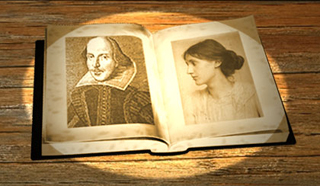
Images of William Shakespeare and Virginia Woolf. (Image courtesy of Vinimay Kaul.)
Instructor(s)
Diana Henderson
MIT Course Number
21L.701 / WGS.510J
As Taught In
Spring 2001
Level
Undergraduate
Course Description
Course Features
Course Description
How does one writer use another writer's work? Does it matter if one author has been dead 300 years? What difference does it make if she's a groundbreaking twentieth-century feminist and the writer she values has come to epitomize the English literary tradition? How can a novelist borrow from plays and poems? By reading Virginia Woolf's major novels and essays in juxtaposition with some of the Shakespeare plays that (depending on one's interpretation) haunt, enrich, and/or shape her writing, we will try to answer these questions and raise others. Readings in literary criticism, women's studies, and other literary texts will complement our focus on the relationship--across time, media, and gender--between Shakespeare and Woolf. As a seminar, we will work to become more astute readers of literature within its historical, artistic, and political contexts, and consider how literature both reflects and contributes to these societal frameworks. Central texts will include Shakespeare's Othello, Antony and Cleopatra, Cymbeline, and The Winter's Tale, and Woolf's A Room of One's Own, Mrs. Dalloway, Orlando, To the Lighthouse, The Waves, and Between the Acts. This subject is an advanced seminar in both the Literature and the Women's Studies Program.
Other Versions
Other OCW Versions
OCW has published multiple versions of this subject. ![]()
- 21L.701 Literary Interpretation: Literature and Urban Experience (Spring 2009)
- 21L.701 Literary Interpretation: Beyond the Limits of the Lyric (Fall 2006)
- 21L.701 Literary Interpretation: Literature and Photography: The Image (Fall 2005)
- 21L.701 Literary Interpretation: Interpreting Poetry (Fall 2003)


